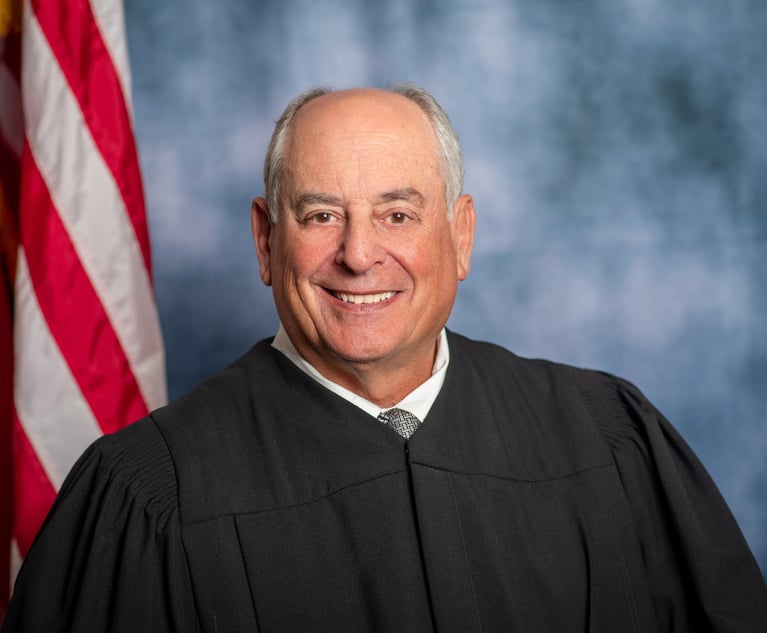 Bentley Adams III (Courtesy photo)
Bentley Adams III (Courtesy photo)Appeal: Ex-Worth County Sheriff's Secret Jail Recordings Should Void Guilty Plea
An attorney for a man who pleaded guilty to aggravated child molestation is hoping to withdraw his plea after learning that ex-Worth County Sheriff Jeff Hobby—who was subsequently indicted and jailed—had installed a clandestine recording device in the attorney-client interview room.
January 08, 2019 at 04:52 PM
6 minute read
In the wake of last year's indictment and guilty plea of former Worth County Sheriff Jeff Hobby for violating his oath of office and invasion of privacy related to the placement of a recording device in the county jail's interview room, an attorney is asking the Georgia Court of Appeals to allow his client to withdraw his guilty plea and void a 25-year sentence for aggravated child molestation.
Hobby—who was first suspended from office and then indicted in 2017 over a mass search of Worth County High School school students that ultimately led to a $3 million settlement with the county—pleaded guilty to three oath of office violations last July and served six months to resolve the charges in both the search and recording cases.
But a Hawaii-based lawyer said Hobby's clandestine recording of dozens of interviews between inmates and their lawyers—including at least 10 involving his client—raises the question of whether prosecutors accessed the recordings and used them to leverage increased sentences against his client.
Bentley Adams III, who lives in Lihu'e, Hawaii, and is licensed to practice there and in Georgia, said he took up the cause of Thomas Bradshaw after reading about the snowballing scandals that led to Hobby's arrest and convictions.
Adams' appellate brief asks the appeals court to reverse a trial judge's refusal to allow Bradshaw to withdraw his guilty plea, arguing that prosecutors with the office of Tifton Circuit District Attorney Paul Bowden knew about the recordings before pushing Bradshaw to take the plea and seemed to have information that could have come only from the private conversations.
“Were the state's attorneys listening to the recordings or being briefed by the officers who did the bugging?” asked his brief. “Is that why every time his lawyer talked to them the plea offer went up? Did knowledge of appellant's meetings with his lawyer give them an unfair advantage in plea negotiations and trial preparation? Is this why they didn't disclose?”
Bradshaw's appointed lawyers should have asked those questions, he wrote.
“They most certainly will be asked if this case is reversed and remanded as it must be,” the brief said.
Bowden, whose indictment against Hobby included 90 counts of invasion of privacy related to the recording, said he was not aware of any other appeals related to the surreptitious surveillance and didn't think Bradshaw's appeal was likely to impact his case.
“Bradshaw is the only appeal that … has raised that issue to my knowledge,” Bowden said in an email. “Due to the circumstances of the guilty plea and complete disclosure prior to the plea, I do not believe there is any error in the court accepting Mr. Bradshaw's plea or in denying his subsequent motion to withdraw the plea.”
Hobby has already served his sentence and is free, Bowden said.
The sheriff's troubles started in April 2017 when his deputies swooped into Worth High and performed a mass search of hundreds of students that many said included invasive and inappropriate touching, sometimes beneath the students' clothing.
No illegal drugs were found.
In October 2017, Hobby was indicted for violation of oath of office, false imprisonment and sexual battery and suspended from office by order of Gov. Nathan Deal. Two months later, additional charges of influencing witnesses and obstruction were filed after he told sheriff's department employees not to cooperate with the investigation.
Early last year, the interim sheriff discovered that the attorney interview room had been outfitted with audio and video recordings since the previous year. In May, Hobby was indicted on one count of violation of oath of office and 89 counts of invasion of privacy.
Last summer, the county agreed to pay $3 million to settle the civil suit with nearly 800 students subjected to the searches.
Hobby's plea was entered in July. Among those recorded were Bradshaw and his lawyer, assistant Tifton Circuit public defender Chauntilia Adaway.
According to Adams' filings, Bradshaw had been indicted in January 2017 for aggravated child molestation, child molestation and possession of drug-related objects.
He was initially offered a plea deal of 20 years with 15 to serve in prison but rejected it.
Bradshaw subsequently entered an Alford plea, in which a defendant does not confess guilt but agrees to be sentenced, and Worth County Superior Court Judge William Reinhardt sentenced him to 25 years with no parole.
In April, he attempted to withdraw his guilty plea, but Reinhardt denied the motion.
Adams' motion said Bradshaw's lawyer should have made “specific inquiries as to whether the sheriff's wiretapping activities extended to [Bradshaw's] meetings with his attorney.”
Even if Bradshaw's lawyer “didn't know anything about the sheriff's shenanigans at the jail, she should have,” it said. “She should have argued this misconduct required the guilty plea be set aside and appellant re-tried in a fair process which did not involve the police listening in on his conversations with his lawyer.”
Adaway said she could not discuss her clients' cases in detail.
“I was not aware at the time that there were cameras in the room; I was made aware some months later,” she said.
Adaway said she has not filed any appeals but is keeping her options open.
“All of my cases that involved [the recording] are still pending, so I have filed motions to preserve the evidence,” she said.
Adaway noted that some of the inmates who were subjected to the secret recording have filed civil actions in Worth County Superior Court.
Last year, the local chapter of the NAACP announced that it was helping dozens of current and former inmates file suit over the recordings.
This content has been archived. It is available through our partners, LexisNexis® and Bloomberg Law.
To view this content, please continue to their sites.
Not a Lexis Subscriber?
Subscribe Now
Not a Bloomberg Law Subscriber?
Subscribe Now
NOT FOR REPRINT
© 2024 ALM Global, LLC, All Rights Reserved. Request academic re-use from www.copyright.com. All other uses, submit a request to [email protected]. For more information visit Asset & Logo Licensing.
You Might Like
View All
Georgia Supreme Court Honoring Troutman Pepper Partner, Former Chief Justice
2 minute read
'A 58-Year-Old Engine That Needs an Overhaul': Judge Wants Traffic Law Amended
3 minute read
Appeals Court Removes Fulton DA From Georgia Election Case Against Trump, Others
6 minute read
Family of 'Cop City' Activist Killed by Ga. Troopers Files Federal Lawsuit
5 minute readTrending Stories
- 1'Largest Retail Data Breach in History'? Hot Topic and Affiliated Brands Sued for Alleged Failure to Prevent Data Breach Linked to Snowflake Software
- 2Former President of New York State Bar, and the New York Bar Foundation, Dies As He Entered 70th Year as Attorney
- 3Legal Advocates in Uproar Upon Release of Footage Showing CO's Beat Black Inmate Before His Death
- 4Longtime Baker & Hostetler Partner, Former White House Counsel David Rivkin Dies at 68
- 5Court System Seeks Public Comment on E-Filing for Annual Report
Who Got The Work
Michael G. Bongiorno, Andrew Scott Dulberg and Elizabeth E. Driscoll from Wilmer Cutler Pickering Hale and Dorr have stepped in to represent Symbotic Inc., an A.I.-enabled technology platform that focuses on increasing supply chain efficiency, and other defendants in a pending shareholder derivative lawsuit. The case, filed Oct. 2 in Massachusetts District Court by the Brown Law Firm on behalf of Stephen Austen, accuses certain officers and directors of misleading investors in regard to Symbotic's potential for margin growth by failing to disclose that the company was not equipped to timely deploy its systems or manage expenses through project delays. The case, assigned to U.S. District Judge Nathaniel M. Gorton, is 1:24-cv-12522, Austen v. Cohen et al.
Who Got The Work
Edmund Polubinski and Marie Killmond of Davis Polk & Wardwell have entered appearances for data platform software development company MongoDB and other defendants in a pending shareholder derivative lawsuit. The action, filed Oct. 7 in New York Southern District Court by the Brown Law Firm, accuses the company's directors and/or officers of falsely expressing confidence in the company’s restructuring of its sales incentive plan and downplaying the severity of decreases in its upfront commitments. The case is 1:24-cv-07594, Roy v. Ittycheria et al.
Who Got The Work
Amy O. Bruchs and Kurt F. Ellison of Michael Best & Friedrich have entered appearances for Epic Systems Corp. in a pending employment discrimination lawsuit. The suit was filed Sept. 7 in Wisconsin Western District Court by Levine Eisberner LLC and Siri & Glimstad on behalf of a project manager who claims that he was wrongfully terminated after applying for a religious exemption to the defendant's COVID-19 vaccine mandate. The case, assigned to U.S. Magistrate Judge Anita Marie Boor, is 3:24-cv-00630, Secker, Nathan v. Epic Systems Corporation.
Who Got The Work
David X. Sullivan, Thomas J. Finn and Gregory A. Hall from McCarter & English have entered appearances for Sunrun Installation Services in a pending civil rights lawsuit. The complaint was filed Sept. 4 in Connecticut District Court by attorney Robert M. Berke on behalf of former employee George Edward Steins, who was arrested and charged with employing an unregistered home improvement salesperson. The complaint alleges that had Sunrun informed the Connecticut Department of Consumer Protection that the plaintiff's employment had ended in 2017 and that he no longer held Sunrun's home improvement contractor license, he would not have been hit with charges, which were dismissed in May 2024. The case, assigned to U.S. District Judge Jeffrey A. Meyer, is 3:24-cv-01423, Steins v. Sunrun, Inc. et al.
Who Got The Work
Greenberg Traurig shareholder Joshua L. Raskin has entered an appearance for boohoo.com UK Ltd. in a pending patent infringement lawsuit. The suit, filed Sept. 3 in Texas Eastern District Court by Rozier Hardt McDonough on behalf of Alto Dynamics, asserts five patents related to an online shopping platform. The case, assigned to U.S. District Judge Rodney Gilstrap, is 2:24-cv-00719, Alto Dynamics, LLC v. boohoo.com UK Limited.
Featured Firms
Law Offices of Gary Martin Hays & Associates, P.C.
(470) 294-1674
Law Offices of Mark E. Salomone
(857) 444-6468
Smith & Hassler
(713) 739-1250






